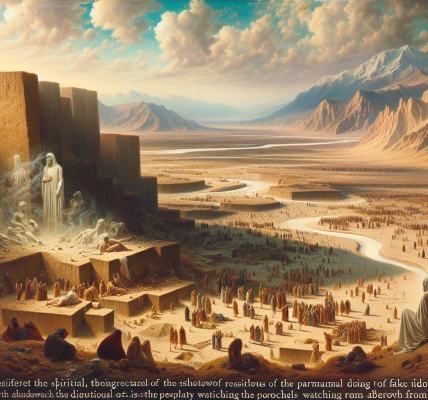**The Reign of Asa: A King Who Sought the Lord**
In the land of Judah, after the days of Rehoboam and Abijah, there arose a new king—a man whose heart was wholly devoted to the Lord. His name was Asa, the son of Abijah, and he reigned in Jerusalem for forty-one years. Unlike the kings before him, who had allowed idolatry to creep into the land, Asa determined to cleanse Judah and lead his people back to the worship of the one true God.
### **A Kingdom Purged of Idolatry**
When Asa first took the throne, he looked upon his kingdom with sorrow. High places and pagan altars stood on every hill; Asherah poles, symbols of foreign gods, towered in the groves. The people had mingled the worship of Yahweh with the abominations of the nations around them. But Asa would not tolerate such wickedness.
With the authority of a king and the zeal of a prophet, he commanded that the altars of the foreign gods be smashed, the sacred pillars broken, and the Asherah poles cut down. He sent his officials throughout the cities of Judah, even into the territories of Ephraim that his father Abijah had captured, and they purged the land of idolatry. The people watched in awe as the symbols of false gods were reduced to rubble, and the king’s decree echoed across the land: *”Seek the Lord, the God of your fathers, and obey His commandments!”*
### **A Time of Peace and Prosperity**
Because of Asa’s faithfulness, the Lord granted Judah a season of rest. No enemy dared rise against them, for the hand of God was upon the land. Farmers plowed their fields without fear of raiders; merchants traveled safely along the roads; mothers rocked their children to sleep without the sound of war drums in the distance.
Asa, knowing that peace was a gift from God, did not grow complacent. Instead, he used this time of tranquility to strengthen his kingdom. He commanded the people of Judah to build fortified cities with walls, towers, gates, and bars. “The land is ours,” he declared, “but we must be wise stewards of what the Lord has given us.”
The people labored with joy, for they saw the blessing of the Lord upon their work. The cities rose strong and secure, their walls unshaken, their gates unbroken. Asa also built up the army of Judah, training three hundred thousand mighty men of valor from his own tribe, and another two hundred and eighty thousand from Benjamin—men who carried large shields and drew the bow with skill. The kingdom stood prepared, not in arrogance, but in humble reliance on the Lord their God.
### **The Invasion of Zerah the Ethiopian**
But peace does not last forever in a fallen world. In the tenth year of Asa’s reign, a great threat emerged from the south. Zerah the Ethiopian, a mighty warrior-king, marched against Judah with an army so vast it seemed to cover the earth—a million men and three hundred chariots. Like a storm rolling in from the desert, they advanced toward Mareshah, a city in the lowlands of Judah.
Fear gripped the hearts of the people. The numbers were overwhelming; the chariots gleamed like blades in the sun. Many whispered that defeat was certain. But King Asa did not waver. He gathered his army and went out to meet Zerah, not in his own strength, but in the name of the Lord.
### **Asa’s Prayer and Divine Deliverance**
The two armies faced each other in the Valley of Zephathah near Mareshah. The air was thick with tension, the scent of sweat and leather mingling with the dust kicked up by restless horses. Asa stood before his troops, his voice ringing out with unwavering faith:
*”O Lord, there is no one like You to help the powerless against the mighty. Help us, O Lord our God, for we rely on You, and in Your name we have come against this vast army. O Lord, You are our God; do not let mere mortals prevail against You!”*
The moment Asa finished his prayer, the Lord moved. Before the eyes of all Judah, the mighty Ethiopian host was struck with confusion. The chariots became entangled; the warriors turned their swords against one another in panic. The army of Judah, seeing the hand of God at work, raised a great shout and charged forward.
The battle was not long. The Ethiopians fled in terror, their ranks shattered, their pride humbled. The men of Judah pursued them all the way to Gerar, plundering the enemy camp, taking vast amounts of livestock, goods, and treasures. The surrounding cities, seeing the power of God with Judah, fell into fear, and none dared oppose Asa again.
### **A Triumphant Return**
With shouts of victory and songs of praise, the army of Judah returned to Jerusalem, driving before them the spoils of war—flocks, herds, gold, and silver beyond measure. The people rejoiced, for they knew it was not by their own might, but by the Spirit of the Lord, that they had triumphed.
Asa gathered the people and led them in thanksgiving. The prophet Azariah came forward and declared, *”The Lord is with you when you are with Him. If you seek Him, He will be found by you, but if you forsake Him, He will forsake you.”*
Hearing these words, Asa renewed his covenant with God. He led a great assembly in Jerusalem, where they sacrificed seven hundred oxen and seven thousand sheep from the plunder, entering into a solemn oath to seek the Lord with all their heart and soul.
And for many years, the land of Judah knew peace, for they had a king who walked in the ways of the Lord.
**Thus, the reign of Asa stood as a testament—a reminder that victory belongs not to the strong, but to those who trust in the name of the Lord Almighty.**




